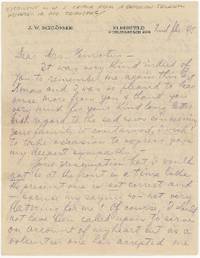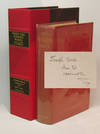
A Unique Letter of a WWI German Soldier to an American Woman
by J. W. Schlosser
- Used
- Condition
- General wear.
- Seller
-
Tolland, Connecticut, United States
Payment Methods Accepted
About This Item
Elberfeld, Germany, 2-Feb-15. General wear.. An amazing letter from J. W. Schlosser to American Heiress, Emily Hockaday Blair Henrotin, in 1915 detailing and observations on the war, both as a soldier and a man on the home front. J. W. Schlosser was a young German man who was studying in England on the onset of the First World War. He returned to his home country and joined the Calvary, and was a part of the Cuirassier Regiment Number 7. (Note: Schlosser spells it Kuirassier in his letter) Schlosser was in the unique position of serving on both the Western Front (France) and Eastern Front (Russia) in the Fall of 1914, before being injured and returned home to Elberfeld to recuperate. This places Schlosser in the position to accurately report on the first year of WWI from all sides (both battle fronts and the home front) from the German perspective. In his letter, Schlosser exudes the optimism both sides had during the first year of the war, the belief that it would be a short, decisive war, and a relatively easy victory for their side. Schlosser was writing to Emily Hockaday Blair Henrotin, who lived in New York with her husband. It is unclear how Schlosser and Emily knew each other, perhaps they met on one of the European tours she went on. Little is known about J. W. Schlosser himself, beyond the information he provides in the letter. Below are some excerpts from the letter.
"I had two months military training and then joined my regiment in the North of France. There was, unfortunately, at that time, not kind work for cavalry and we had to assist the Infantry by going into the trenches. I had a few weeks of that, saw some very heated battles and some dreadful sights that I never wish to see again. I had, too, to [sic] fight my former friends the English. All very disagreeable things! My regiment was then sent by rail to the German East frontier against the Russians and here, we had, on the whole, a fine time of it. We advanced about 100 miles into Russia and I had just begun to enjoy campaigning as a very exciting sport on horseback with occasional shooting when I had the misfortune to get hit by a Russian bullet. I was very nearly captured at that occasion but my comrades helped me out very bravely."
"The feeling of the people is simply splendid and makes one (sometimes nearly a little unexpectedly) proud of being a German. There is to all of us no doubt as to our ultimate victory. Germany is so beautifully strong and so rich - - of course, we all want a quick end to this dreadful war, but if it is a question of the extinction of our nation we shall last, longer than France and Russia, of that i am sure. As to England, our most serious enemy, I don't know. Personally I hope for a chance of compromising as I don't think we can damage her sufficiently. In Germany life is going on just as in ordinary time and I am sure you would not notice any difference except the greater number of soldiers and officers one sees in the streets. All factories are working full time, there is no difference in the train service which is as good and punctual as of old. Theatres, concerts musicals are going on as usual, prices of food have not risen and from one glance through the streets of our big cities you can see that we have still millions and millions of able-bodied men who, in case of necessity, could all be made into soldiers."
"Please do not believe any of those ridiculous tales and lies of the cruelties of the German soldiers. The German soldier is the most "gutmutig" [good-natured] of the world and I have after seem him nurse the children and share his small rations of food with his involuntary host in Russia, France, and even Belgium. But modern war is cruel and can by all effort not be turned into a paroxysm of humanity!"
8 manuscript pgs written on personal stationary. Envelope included. Measures 7 3/4" x 6"
Emily was born on November 16, 1883 to Francis "Farver" Preston Blair (1856-1914)and Florence "Mudgie" Augustus Price (1861-1935) in Missouri. Both her mother and father were a part of well-known and prestigious families in the 1800s. Her mother was from a prominent, pioneering Missouri family, the Prices. Her grandfather Robert Beverly Price was a well-known banker and gentleman farmer, who was active in local politics. He was also greatly involved in the financial success of his alma mater, the University of Missouri. Emily herself attended the university in 1907. On her father's side of the family, she was a part of one of the most powerful political families of the 19th century, the Blairs, who advised several U.S. Presidents across the party lines including Andrew Jackson, Martin Van Buren and Abraham Lincoln. One member of the family even ran as the Vice Presidential candidate for Horatio Seymour's on the Democratic Party losing presidential ticket in 1868. In 1911 Emily herself would eventually marry Edward "Ted" Clement Henrotin (1874-1945) , a member of the prominent Chicagoan Henrotin family, the Henrotins. Her in-laws were the Chicago power couple of Ellen Martin Henrotin and Charles Henrotin. Ellen was a writer, activist and staunch suffragette, while Charles was a prominent banker who founded the Chicago Stock Exchange and eventually became an influential person in global politics as he was Consul to both Belgium and Turkey. Emily and Ted would eventually move to Cherryplain, New York, where she and her husband lived on the farm Road's End and were involved in farming and sheep breeding. Emily and Ted would have one child together, a son, Preston Blair Henrotin (1918-1976). Emily H. B. Henrotin would die in 1965.
Emily was born on November 16, 1883 to Francis "Farver" Preston Blair (1856-1914)and Florence "Mudgie" Augustus Price (1861-1935) in Missouri. Both her mother and father were a part of well-known and prestigious families in the 1800s. Her mother was from a prominent, pioneering Missouri family, the Prices. Her grandfather Robert Beverly Price was a well-known banker and gentleman farmer, who was active in local politics. He was also greatly involved in the financial success of his alma mater, the University of Missouri. Emily herself attended the university in 1907. On her father's side of the family, she was a part of one of the most powerful political families of the 19th century, the Blairs, who advised several U.S. Presidents across the party lines including Andrew Jackson, Martin Van Buren and Abraham Lincoln. One member of the family even ran as the Vice Presidential candidate for Horatio Seymour's on the Democratic Party losing presidential ticket in 1868. In 1911 Emily herself would eventually marry Edward "Ted" Clement Henrotin (1874-1945) , a member of the prominent Chicagoan Henrotin family, the Henrotins. Her in-laws were the Chicago power couple of Ellen Martin Henrotin and Charles Henrotin. Ellen was a writer, activist and staunch suffragette, while Charles was a prominent banker who founded the Chicago Stock Exchange and eventually became an influential person in global politics as he was Consul to both Belgium and Turkey. Emily and Ted would eventually move to Cherryplain, New York, where she and her husband lived on the farm Road's End and were involved in farming and sheep breeding. Emily and Ted would have one child together, a son, Preston Blair Henrotin (1918-1976). Emily H. B. Henrotin would die in 1965.
Reviews
(Log in or Create an Account first!)
Details
- Bookseller
- Eclectibles
(US)
- Bookseller's Inventory #
- 28015702
- Title
- A Unique Letter of a WWI German Soldier to an American Woman
- Author
- J. W. Schlosser
- Book Condition
- Used - General wear.
- Quantity Available
- 1
- Place of Publication
- Elberfeld, Germany
- Date Published
- 2-Feb-15
- Keywords
- ww1, trenches, Calvary, Cuirassier, russia, france, wartime, homefront, england
- Bookseller catalogs
- Historical Memorabilia (46); Political/Social (122);
Terms of Sale
Eclectibles
All material is shipped subject to approval, but notification of return must be made in a timely manner and returns made in a prompt and conscientious fashion.
About the Seller
Eclectibles
Biblio member since 2014
Tolland, Connecticut
About Eclectibles
As our name implies we provide diverse offerings of ephemera and related items. Some areas of note are childhood ephemera and books, social history and women's history, visual culture, advertising in America, historical memorabilia, made by hand, transformation material and the study of childhood. As a member of the Appraisers Association of America, I also provide appraisal services in our areas of expertise with a focus on large collections.
Glossary
Some terminology that may be used in this description includes:

